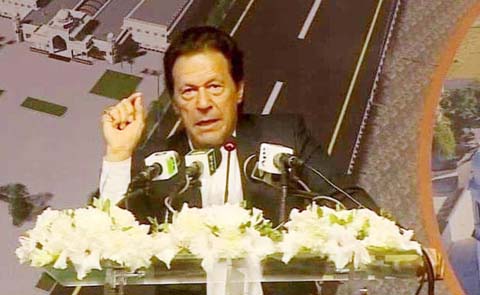
Agencies :
Pakistan’s Prime Minister Imran Khan said his political party and the nation’s powerful military are “all on one page” in wanting to mend ties with India.
“We want to move forward, we want a civilized relationship,” Khan said in a speech on Wednesday while opening a border crossing with India for Sikh pilgrims in Punjab. The former cricket star reiterated his July election victory pledge that “if India takes one step forward, then we will take two steps forward toward friendship.” The loosening of border controls for the pilgrims is “a step towards peace which our region needs,” Pakistan’s Army Chief General Qamar Javed Bajwa said while attending the Kartarpur Corridor ceremony.
The military in Pakistan is the nation’s most powerful institution and has directly ruled the country for large parts of its 71-year-history. Having fought three major wars with India since the partition of British India in 1947, much of Pakistan’s military thinking is directed by the fear of Indian encirclement, thwarting many attempts at outreach and peace in the past.
New Delhi has so far been reluctant to engage substantially with Islamabad. Previous disbelief in India over Khan’s promises speaks to what analysts say is a fundamental truth about Pakistan. The country’s key foreign and national security policies are decided by Pakistan’s powerful generals, who were accused of engineering Khan’s assent to power-charges the top brass and the former cricket star deny.
In September, India’s foreign minister pulled out of planned talks with her Pakistani counterpart after violence flared in Kashmir, which New Delhi blamed on Pakistan-based terrorists. It would have been the nuclear-armed neighbors’ first senior-level talks in three years. Instead they traded barbs from the United Nations General Assembly podium.
In his speech, Khan said Pakistan’s “only problem” with India is Kashmir, “the resolution of which only takes us two determined leaders across the border.”
Yet a decade after the Mumbai attacks, India has sought to highlight that the leaders of the terrorist outfit that carried out the assault, Lashkar-e-Taiba, are still at large and living openly in Pakistan.
A spokesman for India’s foreign ministry said it was “deeply regrettable” that Khan has used the occasion of the pilgrim border opening to make a political statement on the status of Kashmir.
Pakistan must also “take effective and credible action to stop providing shelter and all kind of support to cross border terrorism from territories under its control,” they said.

